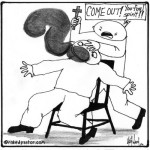We run our website the way we wished the whole internet worked: we provide high quality original content with no ads. We are funded solely by your direct support. Please consider supporting this project.
How do you respond to 2 Thessalonians 2:11–12?
Of those who disobey the truth Paul says, “…God sends them powerful delusions, leading them to believe what is false so that all who have not believed the truth but took pleasure in unrighteousness will be condemned.”
This passage is sometimes cited as evidence that the delusions that unbelievers embrace are as much a part of God’s sovereign will as believers’ enlightenment. Yet, compatibilists insist, this occurs in such a way that unbelievers are responsible for their delusions though believers have only God to thank for their enlightenment. But there is a less paradoxical (less contradictory?) interpretation of this passage available to us.
First, we should note that the passage says that God “sends…powerful delusions…so that all who have not believed…will be condemned” (emphasis added). The delusions God sends aren’t an explanation for why unbelievers don’t believe. They are instead the way God responds to their unbelief: he condemns it.
Second, it is not too difficult to surmise how God might “send powerful delusions” in response to unbelief without directly attributing deception to God. Sometimes the intentions of evil spirits fit in with God’s intention to judge people (e.g.Judg. 9:23; 2 Sam. 24:1, 1 Chron. 21:1). There is a certain poetic justice in letting deceiving spirits delude people who have already demonstrated that they want to believe lies. It’s significant that elsewhere Paul says that Satan, “the god of this age,” blinded the minds of unbelievers (2 Cor. 4:4). I believe that this conception lies behind Paul’s word to the Thessalonians.
Category: Q&A
Tags: Q&A, Responding to Calvinism
Topics: Providence, Predestination and Free Will
Verse: 2 Thessalonians 2
Related Reading

What’s the significance of Isaiah 63:8-10?
The Lord said (or “thought”) to himself, “Surely they are my people, chidren who will not deal falsely.” So, the text says, “He became their savior” (Isa. 63: 8). But “they rebelled and grieved his holy spirit.” So the Lord “became their enemy” (9-10). If the future is exhaustively settled from all eternity, how could…

How do you respond to Acts 4:27–28?
The Christians in Jerusalem proclaim to the Lord, “…both Herod and Pontius Pilate, with the Gentiles and the peoples of Israel, gathered together against our holy servant Jesus… to do whatever your hand and your plan had predestined to take place.” This passage tells us that Herod, Pilate, the Gentiles and the peoples of Israel…

What is the significance of Hosea 8:5?
The Lord asks, “How long will they [Israel] be incapable of innocence?” The Lord’s continual striving with Israel regarding their lack of innocence suggests that this question was not merely rhetorical. If God knows the future to be eternally settled, however, he could not in earnest ask this (or any other) question about the future.…

When Did Jesus Bind the Strongman?
Question: In Luke 11:21-22 Jesus said: “When a strong man, with all his weapons ready, guards his own house, all his belongings are safe. But when a stronger man attacks him and defeats him, he carries away all the weapons the owner was depending on and divides up what he stole.” My question is, when…

How do you respond to Acts 2:23 and 4:28?
Question: Acts 2:23 and 4:28 tell us that wicked people crucified Jesus just as God predestined them to do. If this wicked act could be predestined, why couldn’t every other wicked act be predestined? Doesn’t this refute your theory that human acts can’t be free if they are either predestined or foreknown? Answer: In Acts…

